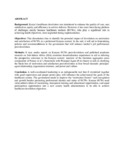| dc.description.abstract | Background: Kenya’s healthcare devolution was introduced to enhance the quality of care, user satisfaction, equity, and efficiency in service delivery. However, it has since been facing plethora of challenges mostly because healthcare workers (HCWs), who play a significant role in achieving health objectives, were neglected during implementation.
Objectives: This dissertation tries to identify the potential impact of devolution on motivation and satisfaction of HCWs in a politicised Kenyan context. In the end, it will aid in formulating policies and recommendations to the government that will enhance worker’s job performance post-devolution.
Methods: It uses media reports on Kenyan HCWs post-devolution and published academic research on Sub-Sahara Africa (SSA) countries decentralisation experiences to aid in inferring the prospective outcomes to the Kenyan context. Analysis of the literature aggregates some components of Franco et al.’s framework with Principal-Agent (P-A) theory to aids in clarifying the black box of motivation and satisfaction post-devolution in four broad channels: principal-agent relationship, organisation structure, and power and culture.
Conclusion: A well-coordinated leadership is an indispensable tool that if crystalized together with good supervision and proper power play, will influence the achievement the goals of the healthcare system. The government needs to improve the “motivation factors” such recognition and growth besides promoting professional identity and status of HCWs. Kenyan HCWs need value-added culture of monitoring, transparent training and educational opportunities, and equal participation opportunities into a new county health administration to be able to achieve healthcare devolution objectives. | en_US |

